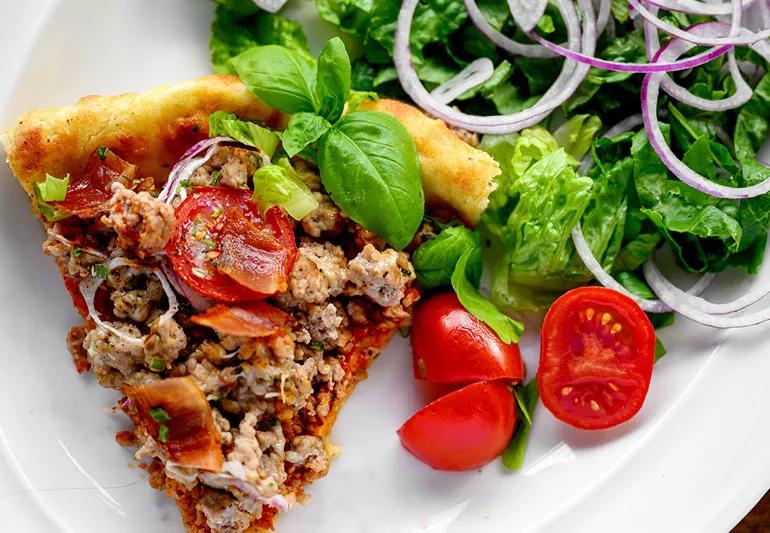Balance, moderation and a positive mindset are key

Whether you’re on a specific diet or just being more aware of eating healthfully, everyone is familiar with temptation — and just one cheat meal won’t wreck the whole effort, right?
Advertisement
Cleveland Clinic is a non-profit academic medical center. Advertising on our site helps support our mission. We do not endorse non-Cleveland Clinic products or services. Policy
There are different schools of thought on the topic and different experts are going to give you a wide range of answers. But according to registered dietitian Kate Patton, RD, LD, yes, a cheat meal is OK now and again, but it comes with caveats.
“Cheat meals” are meals that contain foods that aren’t on your current diet plan or are considered indulgent with a calorie count that would throw off your plan. But the idea that a cheat meal includes unhealthy foods (like a fast-food burger or milkshake) isn’t always the case. It’s about what’s on your health plan.
“Don’t plan a cheat meal just for the sake of having a cheat meal,” advises Patton. “You can always try to go slow at first. Maybe allow yourself to step off your diet just for a very special occasion. If you discover then that it’s not for you, then don’t force it.”
One way to look at your diet and still allow a bit of flexibility for sweet or savory treats is by building in a little flexibility.
It’s all about maintaining a healthy relationship with food and not labeling food as “good” or “bad,” says Patton. The more you can avoid associating food, your consumption and negative thoughts, the better.
Advertisement
She also adds that offsetting your cheat meal or cheat item with extra exercise (within reason, of course) is another way of balancing things out. “Exercising for a longer period or at a higher intensity somewhere else in your day can help with the extra calories you’re adding.”
Now, about those caveats.
First of all, cheat meals don’t work for everyone. It’s easy for them to become a slippery slope into a cheat day or even more regular cheat meals that offset any progress you’re making on your diet. Knowing your eating patterns and how you react to cheat meals is essential.
Keep your cheat meal sensible. You’ll run into trouble when you go all-in on a fast-food banquet. A double-cheeseburger with large fries and a large soda can easily add up for your calorie intake for a whole day in just one meal. And that doesn’t take into account other negative components like sodium and saturated fats.
It’s possible to cycle in something a little indulgent — like a single cheeseburger — with healthier side items (veggies or salads). You’re still increasing your calorie count for the day but not to a point where you can’t make it up. It’s all about that balance and moderation.
Many of us can fall into the trap of treating food like a tool to punish or comfort ourselves. While eating a big slice of cake may help you immediately feel better after a bad day, most times, you’ll eventually feel a bit worse from all that sugar and regret that choice.
Cheat meals can, over time, also create a feeling like a diet or meal plan is all or nothing, that if you don’t strictly follow that plan, you’re a failure. “It’s about maintaining a healthy balance overall,” says Patton. “It’s possible to have a healthy diet or meal plan that doesn’t cut anything out, it just shifts the focus to portion control.”
A diet or healthier food plan should always start with a conversation with your healthcare provider. They’re the best-informed person about your health and what works for you. They can help you come up with a plan that fits your framework or refer you to a nutrition expert who can.
If you find yourself falling into a pattern of cheat meals, there’s a good chance the diet isn’t sustainable for you anyway. Remember, it’s all about the balance and keeping your relationship with food a positive one.
Advertisement
Learn more about our editorial process.
Advertisement

Alternating between periods of eating and fasting may benefit your health

This plant-based eating plan focuses on lowering cholesterol, making it a great companion to the Mediterranean diet

Choose foods that are low in fiber and easy to chew and swallow

The flexible eating plan aims to boost your brain health by focusing on plant-based foods and limiting saturated fat

Designed to lower your blood pressure, this eating plan focuses on heart-healthy foods like whole grains, fruits and vegetables

Pescatarians don’t eat poultry, game or red meat, but they do eat fish and seafood, dairy and eggs

This eating style has many health benefits, including weight loss, an improved microbiome, and increased nutrient and mineral consumption

Research shows promising results from options like the DASH diet and Mediterranean diet

Wearing a scarf, adjusting your outdoor activities and following your asthma treatment plan can help limit breathing problems

Your diet in the weeks, days and hours ahead of your race can power you to the finish line

When someone guilt trips you, they’re using emotionally manipulative behavior to try to get you to act a certain way